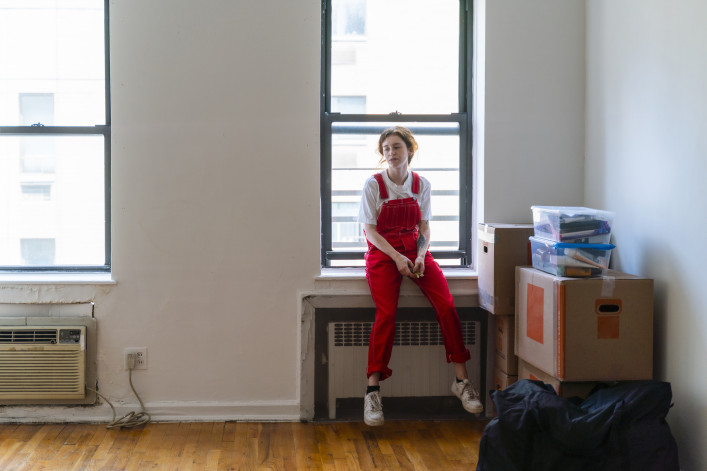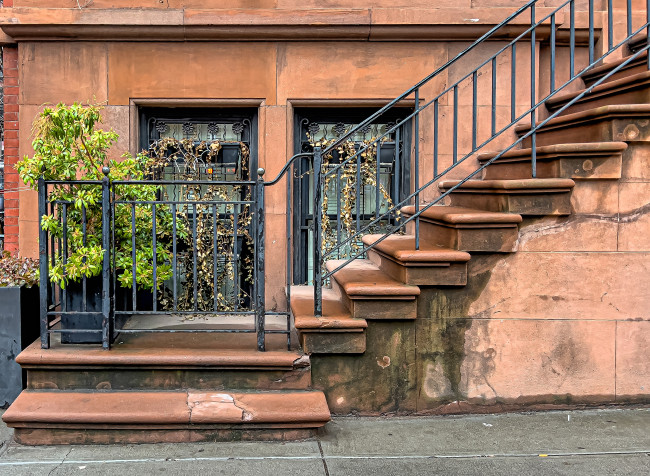3 essential steps for renting a NYC apartment sight-unseen
- Expect to sign a rider that acknowledges you haven’t toured the place in person
- Work with an agent and tap a local friend or family member to see the place
- Research the neighborhood and building extensively—and request measurements

Hopefully, the apartment fits your vibe—and your furniture.
iStock
Whether you’re moving to New York City for a new job, college, or just to downsize, you might need to find an apartment without being able to tour it in person first—meaning you’ll have to take a few more precautions than the average renter.
You’ll have to find a landlord willing to rent to you, avoid online scams, and ideally, get a friend, family member, or agent to tour the unit before you sign the lease. Without serious research, you might end up disappointed, though you can always break your lease down the line or move out at the end of the year. (Just make sure to pay attention to any lease break policy in your lease, said Samuel Kelley, a broker at Keller Williams NYC.)
Renting sight-unseen, however, can sometimes help you land the perfect place if you're willing to take a risk. Brian Hourigan, senior managing director at BOND New York, said he rented the apartment he currently lives in without touring it because he’d had his eye on the building for some time.
When the unit was listed, he quickly confirmed with the management company that the kitchen and bathroom were renovated. Since he knew the layouts of the units in the building, he submitted his application before even seeing the space, Hourigan said, adding that he has “enjoyed my home ever since, with no unpleasant surprises after move-in.”
Still, it’s best to do your research to make sure you know as much as you can about an apartment before you sign a lease. (And that’s good advice regardless of whether you can tour a place.) Read on for three steps to follow when renting an apartment without seeing it first.
Know what you’re getting into
It’s not just renters that get nervous about renting an apartment sight-unseen. Some landlords, worried a renter will be disappointed and try to break their lease, won’t even allow it, Hourigan said.
“There are even some management companies with whom we work which refuse to consider an application to lease one of their units from anyone who hasn't seen the space in person themselves, in an effort to minimize disappointment and issues after the lease is signed,” Hourigan said.
Those landlords that do allow a renter to take an apartment without touring it will always ask you to sign a sight-unseen rider, said Maggie Chong, a broker at SERHANT. This waiver acknowledges that you haven’t seen the apartment and that you’re taking it “as is,” meaning the landlord doesn’t have to make any changes to the unit.
It also protects the landlord’s broker from being “held responsible” for elements of the apartment you “might not have accounted for if they've only viewed it virtually,” Hourigan said.
Try to get a foot in the door
So before you sign on the dotted line, make sure you have someone’s eyes on the unit.
Ideally, you’d rope a trusted friend, family member, or agent into touring the apartment in your stead while you’re watch on via video call, said Molly Franklin, an agent at Corcoran. (Don’t just rely on a pre-recorded video.)
“If you can get an actual human to do the tour, as opposed to just a video tour, I think that really brings a sense of grounded certitude to a deal,” Franklin said.
If your company is paying for your relocation costs, Chong recommends hiring an agent to represent you. A good agent will have the time to walk you through a live video call of the apartment, the neighborhood, the building’s common spaces and more, while a landlord’s agent might only show you the unit itself, Franklin added.
That broker can also evaluate demand for the unit and check out other property amenities, said Josue Gonzalez, an agent at Coldwell Banker Warburg.
“I always include my thoughts on the unit and provide renters with a detailed pro and con list,” Gonzalez said. “Being critical is key, especially when you're the only person providing an opinion on the unit.”
Gonzalez also gets dimensions, a crucial step if you plan to ship large furniture to your place before you arrive. You don’t just need to know your floor plan; make sure you understand the size of your building and apartment’s entrance. (Take it from me: my roommate once shipped her couch across state lines to our NYC apartment, only to discover that it was too large to fit through our apartment door. We had to abandon it and settle for a Walmart loveseat.)
Research the nabe, landlord, and building
Most importantly, you should do your own research to make sure your new apartment matches your expectations—and at the very least, isn’t a total scam.
First, research the neighborhood you want to live in. To get a sense of the local storefronts and shops, you can start with Google Maps images, but the NYC Department of Finance offers more up to date photos online through its Property Information Portal.
If you’re a light sleeper, you should find out whether construction is coming to your block. If you’re worried about crime, Hourigan recommends checking out the NYPD’s crime statistics. You can also learn more about your neighborhood’s risk of climate change by checking out Brick’s climate risk guide.
Next, look into complaints against your building or landlord on HPD Online, your building’s bedbug history, different online reviews, and other properties your would-be landlord owns through Who Owns What in NYC. Past complaints will give you a sense of how the building is run.
“Consulting the NYC DOB website for any outstanding building violations or complaints about a property is a smart tip, whether viewing options in person or remotely,” Hourigan said.
Lastly, it’s a good idea just to double check to make sure the agent you’re dealing with is real. In a disturbing trend, online scammers have been impersonating brokers and agents online to steal thousands of dollars. Look up your agent’s license number and call their home office to confirm you’ve been working with a legit agent.



























